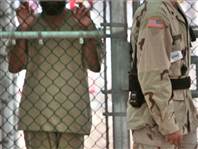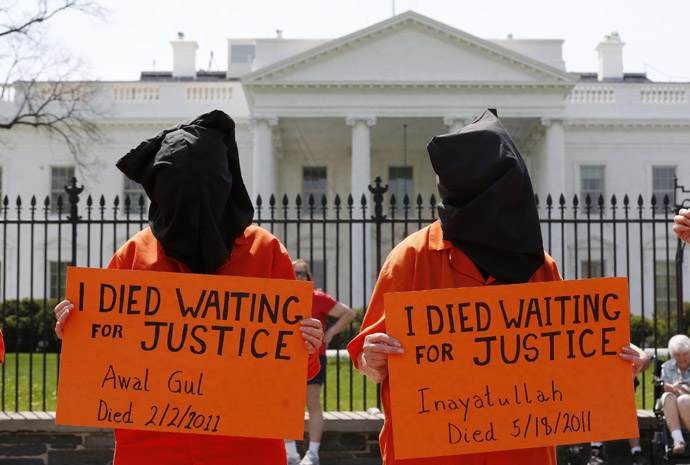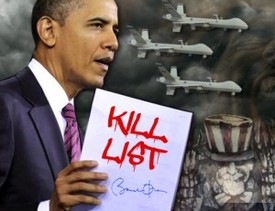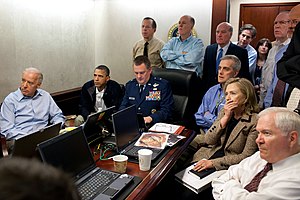..the catalyst in this case is the real possibility that one or more prisoners will die of starvation soon; the odds are, given the raw numbers, that it will be someone we've already decided shouldn't be at Guantánamo, or have given up trying to charge. Prisoners have died there before, but not in a protest so broad and so stark. A wave of deaths would be a political, moral, and foreign-policy disaster, with the seriousness not necessarily in that order.
Curt Wechsler, The World Can't Wait: May 2013 Archives
 Although Obama has indicated that he is set to resume prisoner transfers from Guantanamo Bay, former detainee Moazzam Begg believes innocent people striking for their freedom will not stop unless they see some real action...
Although Obama has indicated that he is set to resume prisoner transfers from Guantanamo Bay, former detainee Moazzam Begg believes innocent people striking for their freedom will not stop unless they see some real action...May 23, 2013
Parliament passed a resolution on the situation of the hunger-striking prisoners in
Guantánamo. The resolution calls on US authorities to treat detainees with respect for
their inherent dignity and to uphold their human rights and fundamental freedoms.The US authorities should review the military commission system to ensure fair trials,
close Guatánamo and prohibit in any circumstances the use of torture, ill-treatment and
indefinite detention without trial, MEPs say.

"Well, there weren't a lot of good choices, and I think Secretary Rumsfeld called it the "least worst place" or something like that...
a related issue was whether the federal courts were going to get involved in trying to manage how the facility worked. And so in the past, the Supreme Court had said prison bases outside the United States, the territory of the United States, which house enemy prisoners at war would not be within the jurisdiction of the federal court system...one thing you want to be concerned about is having that kind of involvement while war is still going on.
 As the Guantanamo hunger strike enters its 100th day, the number of voices, both in the US and around the world, to close the facility are growing stronger and louder... the latest from RT here
As the Guantanamo hunger strike enters its 100th day, the number of voices, both in the US and around the world, to close the facility are growing stronger and louder... the latest from RT here
While promoting the message to Close Guantanamo that we are raising funds to publish in The New York Times, we have been hearing, especially in the Twitterverse, that people think, because Obama promised to close Guantanamo, and says that Congress is not allowing him to do that, the main problem is with Congress. |
 "If the disposal of people's freedom and dignity on the basis of secret and uncontestable information is the sine qua non of the power of kings, so much more so is the power to dispose of their lives*... to claim infallibility and deny evidence to the contrary, and to stonewall requests for information about who is classified as killable
"If the disposal of people's freedom and dignity on the basis of secret and uncontestable information is the sine qua non of the power of kings, so much more so is the power to dispose of their lives*... to claim infallibility and deny evidence to the contrary, and to stonewall requests for information about who is classified as killable
 166 men remain imprisoned at Guantanamo. Most are 100 days into a hunger strike.
Some are near death, many imprisoned for more than ten years. They have lost
hope of being released, although a majority were cleared to leave years ago. As
Adnan Latif, a detainee, wrote during an earlier hunger strike, "Where is the
world to save us from torture? Where is the world to save the hunger strikers?"
Mr. Latif was cleared for release as well, but he died in September 2012, still
waiting for justice.
166 men remain imprisoned at Guantanamo. Most are 100 days into a hunger strike.
Some are near death, many imprisoned for more than ten years. They have lost
hope of being released, although a majority were cleared to leave years ago. As
Adnan Latif, a detainee, wrote during an earlier hunger strike, "Where is the
world to save us from torture? Where is the world to save the hunger strikers?"
Mr. Latif was cleared for release as well, but he died in September 2012, still
waiting for justice.
President Obama had said nothing about Guantanamo for years. Facing a growing outcry, he says that he wants to close it, but that Congress is blocking closure. Even under Congress' existing criteria, however, Obama could have released most of the detainees years ago.
He closed the office responsible for processing prisoners' releases; recently banned commercial flights to the prison to make it harder for lawyers to meet with their clients; barred emergency calls by attorneys to the detainees; ordered forced feeding through excruciating means and by strapping prisoners down (a violation of medical ethics and torture in itself); and authorized an April 13 assault in which guards fired rubber bullets on hunger strikers. Obama does not need Congressional approval: as Commander-in-Chief, he has the power to shut the prison down now.
The continuing torture at Guantanamo is part of larger, alarming developments. When he ran for office, Obama promised to restore the rule of law. Instead he has claimed and exercised unchecked executive powers beyond what George Bush used. He refuses to prosecute officials for their use of torture, yet aggressively prosecutes any whistle-blowers who expose war crimes, most flagrantly in the torture, slander and draconian legal charges against Bradley Manning.
By signing the National Defense
Authorization Act of 2012, Obama made indefinite detention, based on merely an accusation,
the law of the land. These actions amount to institutionalizing and, in
important respects, escalating the "Bush Doctrine."
In the name of "democracy" our government has tortured at least one hundred people to death. In the name of the "war on terror," thousands have been detained without a chance to face their accusers or even know what charges they are held under. In opposition to international law, Obama has advanced a policy of targeted killing across sovereign borders, deciding who will die by Hellfire missiles shot from drones -without charges, trials, or any evidence other than what only Obama and his close advisers deem sufficient.
At least 176 children have
been killed by drones in Pakistan alone and between 3-4,000 non-combatants have
died in drone attacks. John Bellinger, who drafted Bush's justifications for
targeted killings, concludes that the Obama administration has decided to kill
people with drones so that they don't have to imprison them.
Fundamental civil liberties have been eviscerated. In the name of safety, fear, or revenge, American presidents cannot be allowed to arrogate to themselves the power of judge, jury and executioner. Actions that utilize de facto torture, that run roughshod over the rule of law and due process, and that rain down terror and murder on peoples and nations, without any declaration of war, amount to war crimes. Such actions cannot in any way be morally justified in the name of "protecting Americans." The lives of people living here are not more precious than any other nation's lives.
It is up to people to stand up for principle and morality when their institutions and public officials refuse to do so. The fates of those who are maimed or killed by our government's policies are inextricably intertwined with our own: we must listen and respond to their cry for justice. We must demand their release now, before they lose their lives as well.
Donate to further spread this message. Join in visible protest and make your voice heard.

UC Berkeley Billboard

Donations via PayPal
are not tax deductible.

Events & Calendars
Important Reading
Physicians for Human RightsBroken Laws, Broken Lives
NLG White Paper
ON THE LAW OF TORTURE...
The President's Executioner
Detention and torture in Guantanamo
